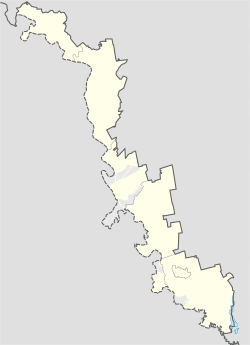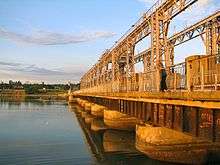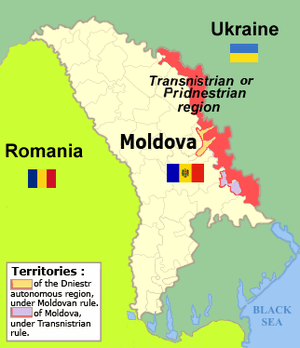Dubăsari
Dubăsari (Romanian pronunciation: [dubəˈsarʲ]; Moldovan Cyrillic: Дубэсарь) or Dubossary (Russian: Дубоссары; Yiddish: דובאסאר; Ukrainian: Дубоcсари) is a city in Transnistria, with a population of 23,650. Claimed by both the Republic of Moldova and the Transnistrian Moldavian Republic, the city is under the latter's administration, and functions as the seat of the Dubăsari (Dubossary) District.
Dubăsari Dubossary | |
|---|---|
.jpg) Liberal Arts College | |
 Dubăsari Location within Transnistria | |
| Coordinates: 47°16′N 29°10′E | |
| Country (de jure) | |
| Country (de facto) | |
| Population (2004) | |
| • Total | 28,500 |
| Time zone | UTC+2 (EET) |
| • Summer (DST) | UTC+3 (EEST) |
| Climate | Dfb |
| Website | http://www.dubossary.ru/ |
Name
The origin of the town name is the plural form of the Romanian archaic word dubăsar ("boatman"), a derivative of dubă ("a small wooden boat"), so "Dubăsari" means "boatmen".
History
Dubăsari is the site of one of the oldest settlements in Moldova, and the Transnistrian region. Stone Age artifacts have been found in the area, and there are several kurgans (presumed Scythian) around the city. First mentions of modern Dubăsari date to the beginning of the 16th century, as a fair populated by Moldavian peasants. The settlement became part of the Russian Empire in 1792, and was granted city status in 1795. It was part of Kherson Governorate from 1803 to 1922.
In 1924–1940, Dubăsari was part of the Soviet-created Moldavian ASSR. The town was heavily industrialized during the pre-WWII period. In the course of World War II, in 1940, when Bessarabia was occupied by the Soviet Union, it became part of the newly created Moldavian SSR. On 27 July 1941, the town was occupied by German and Romanian troops. It was re-captured by Soviet forces in the summer of 1944.
In 1951–1954, the Dubăsari dam, and a 48 MW hydroelectric power plant Dubossarskaya GES was constructed, and Dubossary Reservoir was formed.
Dubăsari and its suburbs were the site of major conflict during 1990–1992, that eventually culminated in the War of Transnistria (1992). Since then, it has been controlled by the breakaway administration of Transnistria.
The city's economy was significantly damaged during the war in 1992.
Population

In 1989, the population of the city was 35,806, including 15,414 Moldovans, 10,718 Ukrainians, 8,087 Russians, and 1,587 others. According to the 2004 Census in Transnistria, the city had 23,650 inhabitants,[2] including 8,954 Moldovans, 8,062 Ukrainians, 5,891 Russians, 153 Belarusians, 104 Bulgarians, 90 Armenians, 49 Poles, 66 Gagauzians, 46 Jews, 39 Germans, 31 Gypsies, and 165 others and non-declared.
Notable natives
- Nikolai Sklifosovsky (1836 in Dubasari — 1904) a Russian surgeon and physiologist of Greek origin
- Pyotr Rachkovsky (1853 in Dubasari – 1910) was chief of Okhrana, the secret service in Imperial Russia. He was based in Paris from 1885 to 1902.
- Ion Creangă (1883 in Corjova - ??) was a Bessarabian politician
- Isidor Sârbu (1886 in Corjova - ??) was a Moldavian victim of dekulakization.
- Yosef Baratz (1890 in Coşniţa - 1968 in Israel) was a Zionist activist and Israeli politician.
- Nichita Smochină (1894 in Mahala – 1980 in Bucharest) was a Transnistrian-born activist, scholar and political figure, especially noted for campaigning on behalf of ethnic Romanians in the Soviet Union
- Leonid Corneanu (1909 in Coşniţa - 1957 in Chișinău) was a Moldovan poet, playwright and folklorist.
- Petru Soltan (1931 in Coşniţa – 2016 in Chișinău) was a Moldovan mathematician and politician
- Timofei Moșneaga (1932 in Corjova – 2014) was a Moldovan physician and public figure who served as the Health Minister of Moldova from 1994 to 1997.
- Vlad Ioviţă (1935 in Cocieri - 1983 in Chişinău) was a writer from Moldova.
- Anatol Codru (1936 in Molovata Nouă - 2010 in Chişinău) was a writer and film director
- Vladimir Voronin (born 1941 in Corjova) a Moldovan politician. He was the third President of Moldova from 2001 until 2009
- Ștefan Urâtu (born 1951 in Ustia) is a politician from Moldova.
- Vlad Grecu, (born 1959 in Dubăsarii Vechi) a Moldovan writer, now lives in Chişinău
- Mykhaylo Okhendovsky (born 1973 in Dubăsari) Ukrainian lawyer and Chairman of the Central Election Commission of Ukraine
- Igor Pugaci (born 1975 in Dubăsari) is a retired a Moldovan road bicycle racer.
- Anna Odobescu (born 1991 in Dubăsari) is a singer who represented Moldova at the Eurovision Song Contest 2019 in Tel Aviv.
- Andrei Tcaci (born 1993 in Dubasari) is a high level manager at the National Bank of Moldova.
In fiction
- The Sisters of the Winter Wood by Rena Rossner is set in Dubossary, before and during the 1903 Kishinev pogrom.[3][4]
References
- Transnistria's status is disputed. It considers itself to be an independent state, but this is not recognised by any country. The Moldovan government and all the world's other states consider Transnistria de jure a part of Moldova territory.
- pridnestrovie.net
- Rena, Rossner (2018-09-25). The sisters of the winter wood (First ed.). New York, NY. ISBN 978-0316483254. OCLC 1009182096.
- "The Sisters of the Winter Wood by Rena Rossner | Jewish Book Council". www.jewishbookcouncil.org (in Portuguese). Retrieved 2018-10-28.
External links
- (in Polish) Dubosary (Dubăsari) in the Geographical Dictionary of the Kingdom of Poland (1881)
- Site of city of Dubăsari
- Dubăsari (in Romanian)
